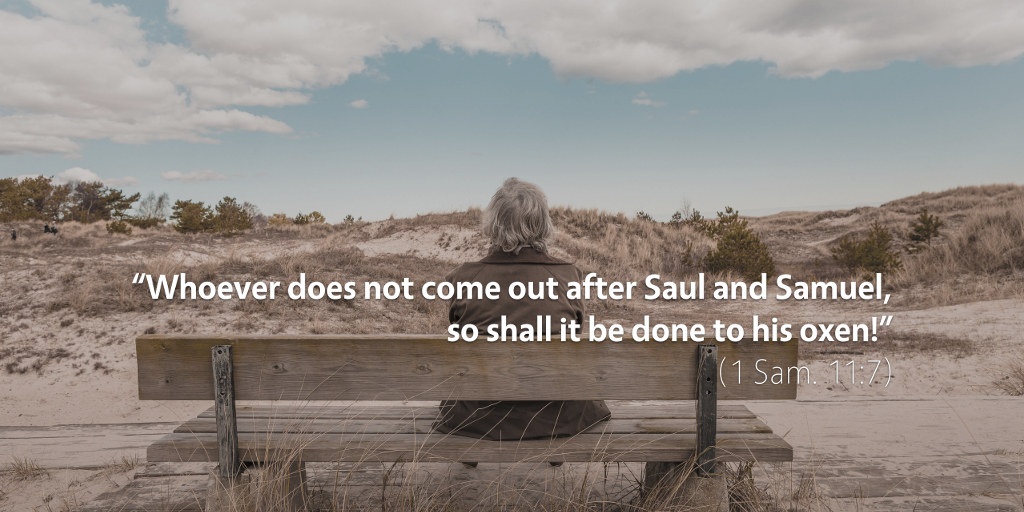Bible Readings for August 19th
1 Samuel 11 | Romans 9 | Jeremiah 48 | Psalm 25
At the end of 1 Samuel 10, the narrator gave us a new, critical detail about Saul: “Saul also went to his home at Gibeah…” (1 Sam. 10:26). We knew that Saul was a Benjaminite, and we knew that Saul claimed to be from the humblest clan of the tribe of Benjamin (1 Sam. 9:21), but now we discover what Saul meant: Israel’s first king descends from the clan who lived in Gibeah, where the brutal rape and murder of the Levite’s concubine had happened in Judges 19. The narrator has withheld this information up until now, but we cannot understand what happens here in 1 Samuel 11 unless we understand the history of Saul’s clan.
When Saul discovers that Jabesh-gilead is under siege, he immediately snaps into action, summoning all Israel to rise to the city’s defense. Now, keep in mind that Jabesh-gilead was the city from which Israel had taken wives for the decimated tribe of Benjamin by slaughtering all the men and all the married women (Judg. 21). Apparently, the Ammonites had recognized that Jabesh-gilead had no way of fighting for itself after losing all its men, and so they went to capture the city and to bring disgrace on all Israel through gouging out the eyes of the city’s inhabitants (1 Sam. 11:2).
But shockingly, when Saul hears this news, he summons Israel’s warriors by reenacting what the Levite had done in Judges 19 when he discovered that his concubine had been murdered. Accordingly, Saul takes a yoke of his oxen, cuts them into pieces, and sends those pieces to all Israel, saying, “Whoever does not come out after Saul and Samuel, so shall it be done to his oxen!” (1 Sam. 11:7). Saul seems to be acknowledging the bloody history of his clan, while nevertheless moving forward from this story in two ways: (1) Saul dismembers animals, not human beings, and (2) Saul summons Israel to defend Jabesh-gilead, rather than to attack them. Then, after the battle is over, Saul refuses to slaughter the men who had opposed his rule, in contrast to how Israel had compounded their sin after slaughtering the people of Jabesh-gilead by kidnapping the virgin women of Shiloh (Judg. 21:16–23). Saul of Gibeah mirrors—but redeems—every part of the terrible story of his clan’s history.
There is much for us to learn from this as we consider the dark parts of our own stories. Rather than hiding them in shame, the gospel of Jesus calls us to confess our sins and move on from them, recognizing that God is powerful enough to redeem even our sins for his own purposes and glory. May God give us boldness to entrust our stories to him—as Saul did—rather than hiding our past sins in shame.
Podcast: Play in new window | Download (5.0MB) | Embed
Subscribe: Apple Podcasts | RSS | More

Scripture quotations are from The Holy Bible, English Standard Version copyright © 2001 by Crossway Bibles, a division of Good News Publishers. Used by permission. All rights reserved.


